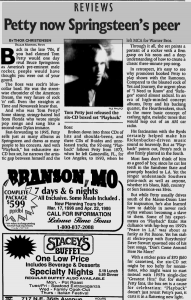Review: Petty now Springsteen's peer
By Thor Christensen
Ocala Star-Banner - Friday, December 8, 1995
Back in the late '70s, if you had claimed Tom Petty would one day rival Bruce Springsteen as America's pre-eminent male rocker, people would have thought you were out of your gourd.
The Boss was rock's blue-collar bard. He was the street-wise chronicler of the American Dream, the very future of rock 'n' roll. Even the straights at Time and Newsweek knew that.
And who was Tom Petty? Some skinny, stringy-haired kid from Florida who wrote simple pop songs and sang like a second-rate Dylan imitator.
Fast-forwarding to 1995, Petty sells just as many albums as Springsteen and draws as many people to his concerts. And with "Playback," his exhaustive six-CD box set, he narrows the artistic gap between himself and the Boss.
Broken down into three CDs of hits and shoulda-beens, and three CDs of B-sides and unreleased tracks, the 92-song "Playback" follows Petty from 19873, when he left Gainesville, FL, for Los Angeles, to 1993, when he left MCA for Warner Bros.
Through it all, the set paints a portrait of a rocker with a firm grasp on his roots and a deep understanding on how to create a classic three-minute pop song.
In retrospect, it's easy to see why promoters booked Petty to play shows with the Ramones. Compared to the bloated rock of Yes and Journey, the urgent pleas of "I Need to Know" and "Refugee" sounded almost radical. In an era of high-minded concept albums, Petty and his backing quartet, the Heartbreakers, stuck to the more basic concept of crafting tight, melodic tunes that would leap out of an AM car radio.
His fascination with the Byrds certainly helped make his Rickenbacker-driven music sound so heavenly. But as "Playback" points out, Petty's rock is also firmly planted in the South.
Most fans don't think of him as a good ol' boy, since he cut his teeth in the Sunshine State and promptly headed to L.A. Yet the singer understands Southern proto-rock as well as anyone, whether its blues, R&B, country or Sun Sessions-era Elvis.
But while Petty usually drives south of the Mason-Dixon Line for inspiration, he's also learned how to dabble in newer rock styles without becoming a slave to them. Some of his experiments on "Playback" fizzle: His dalliance with hip-hop on 1992's "Peace in L.A." was about as funky as Pat Boone. Yet his stab at electro-pop with Eurythmics' Dave Stewart spawned one of his best songs, "Don't Come Around Here No More."
With a sticker price of $70 ($60 for cassettes), the six-CD set might be too hefty for noninitiates, who might want to start instead with 1993's single-disc "Greatest Hits." But for major Petty fans, the box set is a cause for celebration: "Playback" doesn't just revisit Petty's past, it casts it in a flattering new light.

